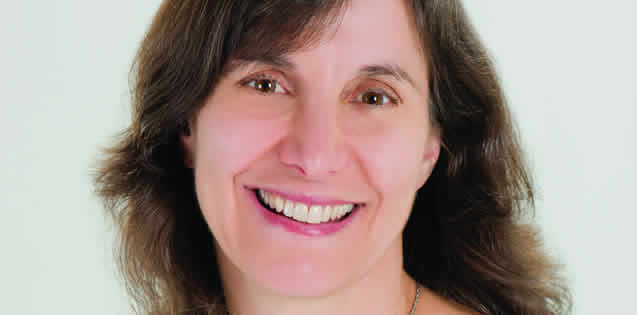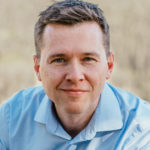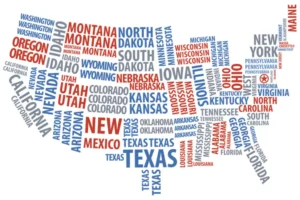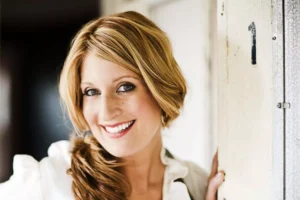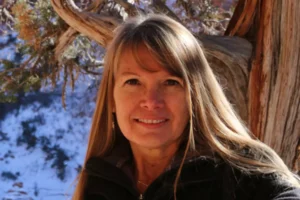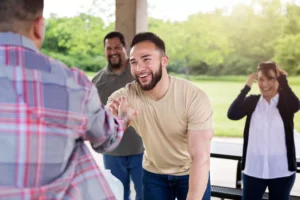A couple of years ago, a YouTube video was going around the Internet of a former lesbian being interviewed about her conversion to Christianity. Her name was Dr. Rosaria Butterfield, and she had written a book called The Secret Thoughts of an Unlikely Convert: An English Professor’s Journey Into the Christian Faith.
I was intrigued by the thoughtful discussion in the video and bought her book, which was about much more than her former sexual identity. Butterfield had strong and insightful opinions on Bible reading, worship, loving the LGBT community, education and adoption, among other things. And behind her “secret thoughts” was an intelligent, unapologetic and winsome conviction about her faith.
She has just published her latest book, Openness Unhindered: Further Thoughts of an Unlikely Convert on Sexual Identity and Union with Christ. And in this interview, I talk with her about a few topics, including her new identity, how she converted, and whether we should call transgendered persons by their preferred gender.
1. I once interviewed a former Muslim who said, “Even the term ‘former Muslim’ makes me feel like I’m forever bound by the life I left.” Does that resonate with you? Do you ever feel like you’d like to get on with your life and simply be Rosaria, the wife, the mom, the educator — not Rosaria, “the former lesbian”?
Yes! And that is in part why I wrote Openness Unhindered: because my identity is in Christ, not in the grab-bag of fallen lusts of the flesh. At the same time, we live in a culture that believes your personhood is inseparable from your sexual desires and/or sexual history, so I feel compelled to show that repentance is the true passage to freedom. I stand in a long and dignified line of godly women: the Mary Magdalene one.
2. I’m fascinated that you, a leftist professor at a prestigious university, found yourself changed by something as simple as repeated and voracious Bible reading. How did you come to see the supernatural stories of the Bible as something more than Jewish fairy tales?
I am a whole book scholar. That means that my job — and about the only reputable skill that I have — is reading a book and sizing it up. Perhaps because I never attended a VBS [Vacation Bible School], I was not subjected to the bereft reading styles that many Christians embrace. It never occurred to me to play roulette with the Bible, to read verses isolated from their historical or intellectual context, to start in the middle of a book because there was a good line somewhere in there, or to read the Bible like a horoscope — one verse for the day. I read the Bible like a book, chronologically, start to finish, examining things like its internal hermeneutics, canonicity, textual authority, and authorship.
At first, ideas like the Bible’s inerrancy, infallibility, sufficiency, and authority seemed outrageous, insulting and ridiculous. But after reading the Bible in big chunks, five hours at one sitting, many days in a row, I could see how, if only I loved the things that God loved, these ideas could become the bridge to what the Bible calls the fruit of the Spirit. I was a divided woman, and the Bible is what tore me in half. I felt pitted between not wanting to repent of my sin (and not really knowing how one repents of a sin of identity) and deeply wanting Jesus, the Jesus who promised a yoke easier than the one that bound me and a burden lighter than the one that crushed me.
Finally, when the Bible got to be bigger inside me than I, I realized that the Bible is the only book in the world that is alive and whose life depends not on my interpretation of it (what we call reader response criticism), but rather on the Lord himself. Jesus is inseparable from the Bible, and when we are bound to Jesus, our very ontology unfolds in its pages.
The Bible compelled me, drew me in, revealed to me that the threshold to God is repentance. It convinced me that the only way to save my life is to lose it. And at the same time, I saw how the Bible organized not just a “me and Jesus” sort of life, but a Bible-believing community. I witnessed, by being included in the lives of Christians while I was an unbeliever, that the Bible made a culture a better place, and in that way, it had a sort of tribal power. I have read and studied a lot of books, and I had never ever before seen or experienced what I did when I became immersed in the Bible and in the Bible-believing families of the Syracuse Reformed Presbyterian Church.
3. It seems like you dramatically converted in a relatively short period of time. Do you ever fear that you could just as easily return to your old life?
I did not convert in a short period of time. It took two years and seven times through the Bible. It was slow and agonizing, and I held off conversion for as long as I could. My steps toward faith in Christ were slow and stumbling.
I was converted in 1999. Three months after my conversion, I became a covenant member of the Syracuse Reformed Presbyterian Church. My pastor and my elders cared for me and counseled me and modeled for me what a life of faith entails. Families in the church took me in, and I learned how to live from within the means of grace, not from watching as a bystander, but by participating in the life of the body.
In 2001, I married Kent Butterfield. Kent has been my firewall, protecting me from taking on too much and modeling for me what a life steeped in the Word and ministry looks like. So there was nothing fast about my conversion. And each time I took a step toward the Lord, He burned the bridge over which I walked so that even if I wanted to, I could not find my way back. Having said this, I do take seriously that my life of past sexual sin — both heterosexual and homosexual — hardened and deadened my conscience, making me dumb and unyielding in the hands of the Spirit.
In addition, my reformed theology has a robust way of helping me understand my sin. It teaches me that daily, I am distorted by original sin, distracted by actual sin, and manipulated by indwelling sin. As the Holy Spirit softens my conscience, I know how deep and dangerous my sin is. And while I stand in the risen Christ alone, I know that obedience is both non-negotiable and always an expression of God’s grace.
Finally, as a member of a church, I am not free floating. I am part of the body, accountable and known, and by God’s grace, my life is filled more with the means of grace than the means of the world. Yes, temptation is serious business. And this is spiritual war. By God’s grace, I am not in this spiritual war alone or unarmed. I am grateful to the Lord that He knows the depths of our sin, the deception of our sin, the weakness of our flesh, and He gives us both a means to escape (1 Corinthians 10:13) and the gift of repentance when we daily fail. But falling does not mean falling away.
4. There’s a resistance among some conservative people to recognize a transgendered person’s preferred gender, but I notice that you do. Why?
Update: Rosaria Butterfield has changed her stance on this and in fact repented of her previous opinion on this issue, going so far as to call it sin. We’ll include her original response, below, for context.
Gender dysphoria is a serious illness. If you are the friend of a person who identifies as transgendered, it is important to conduct yourself with gentleness and care. In Secret Thoughts, I talk about my transgendered friend “J,” and I use the female pronoun (her chosen gender) and not her biological one.
Sometimes in life there is a difference between how to talk to and about someone and how you think about their situation. This is true in many issues in life, not just transgendered issues. It is important, though, for Christians to be good friends to transgendered people, to do a whole lot better than I did with my friend J.
I did not recommend or encourage J to seek sex-reassignment surgery (for which I am grateful now!), and I did bring J to church with me once and into the fellowship with other believers in my church. But I never did offer the help that was needed. I never addressed the Gnosticism of transgendered issues. I simply didn’t know how to at the time.
Now, after reading through the website sexchangeregret.com and meeting Walt Heyer, I have a better understanding. I see now that transgendered issues are a lot like eating disorders, which render a victim unable to see himself or herself clearly. The challenge is how to both respect how a person genuinely feels without encouraging that person to act on feelings that are simply not true. The anorexic is not fat, no matter how fat she may feel. And my friend J was not female, no matter how womanly she felt.
So I clearly don’t have a good track record with helping someone respect feelings that ought not to be acted upon, so don’t follow me. But I will say this: Keep relationships strong, and make sure that your words are never stronger than your relationships. Only a strong relationship can raise the mirror of truth on a deeply-held but untenable belief.
Learn more about Butterfield at RosariaButterfield.com.



